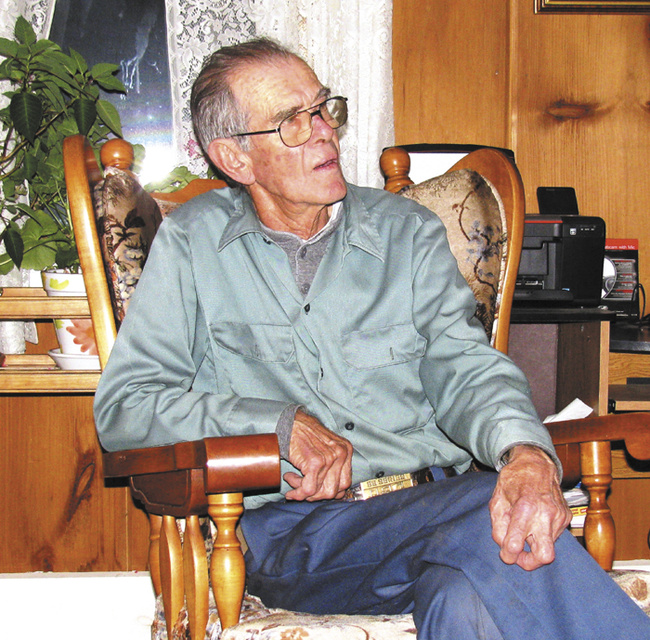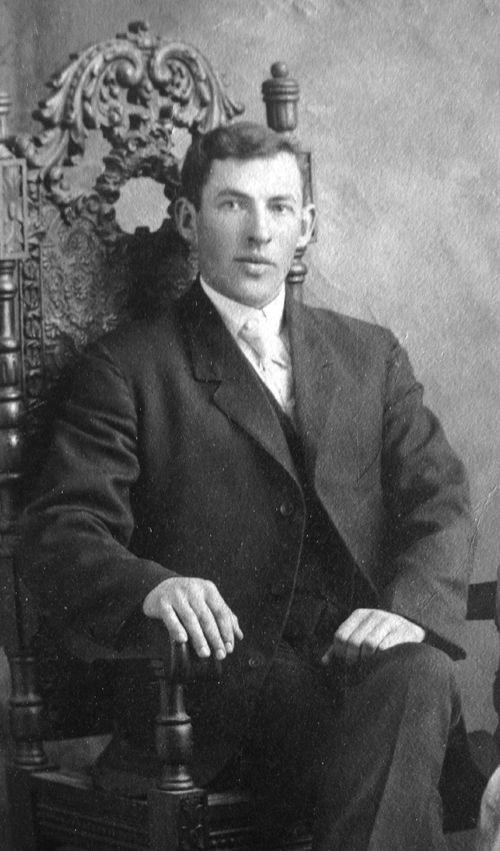FAYETTE — When Carleton Pinkham was 10 years old, he liked to spend as much time as possible at the farm on Sturtevant Hill Road in Readfield owned by his grandfather, Roderick Coffin.
There was haying and hoeing and sowing to be done. In winter, there were sleigh rides around Coffin’s big farm.
Pinkham had two brothers and three sisters, but he got to spend the most time of all of them at his grandfather’s farm.
“I used to get more time because I’d go out and work with the men,” Pinkham said. “I learned to drive oxen when I was about 11 or 12 years old.”
“He was awful good to me,” Pinkham said of Coffin. “I’d go help him with the chores. He appreciated that I loved doing it.”
In May 1966, when Roderick Coffin was 82 years old and Pinkham was 34 and had his own farm, Coffin was interviewed by a university researcher who was interested in preserving his regional dialect. Coffin died in 1975 at age 91.
Pinkham was always interested in obtaining a copy of that university interview, but he had no luck finding it at the University of Maine. It wasn’t until late last year that Pinkham, now 80, had a chance to hear his grandfather’s voice again on a CD.
With the help of Dale Clark, of Vassalboro, who knew Pinkham from when she was growing up in Readfield, Pinkham learned that the interview was conducted by the University of Wisconsin at Madison, not by the University of Maine.
Deb Sylvester, a former Readfield resident now living in Illinois, saw a photo of Coffin’s farmhouse that Clark had posted on the Facebook page “You Might Be From Readfield If. … ” Sylvester posted a note saying she had been present for the University of Wisconsin interview of Coffin and had been asked to leave.
Clark thought of her friend Bob Tucker’s son, Will, who was attending the University of Wisconsin. He was able to put Clark in touch with DARE, the Dictionary of American Regional English, a massive project coordinated by the university.
Within a few days, Clark was able to order three copies of the Coffin interview for $8 apiece, and later she played his grandfather’s interview with field worker Reino Maki, which took place on May 9, 1966, for Pinkham.
“Carleton was very quiet,” Clark said. “He was just totally immersed in it. I think he was very touched.”
Pinkham said it was quite an experience “hearing that voice after all that time.”
“It’s a strange feeling. It takes me back in so many ways to so many places. I always loved what he did,” he said.
Coffin said on the CD that he had moved from Troy to Readfield in 1918. “I went into the woods when I was 17 years old. There was a lot of lumber down on this old farm. Two men would use a crosscut saw.”
Coffin’s border collie, Josephine, squeals in the background of the CD until she’s put outdoors.
“At first I used a hand-sower,” Coffin said. “I sowed acres and acres by hand. That’s all we had.”
Pinkham said he learned to use a crosscut saw when he was 10 years old.
“My father taught me to cut enough hemlock logs to build a second story on the house. A few years later, I ruined my grandfather’s best double-bladed ax. I was using the wrong side and I took a nick right out of the blade of that ax,” he said.
Eventually, Pinkham bought a farm in Fayette that grew to be more than 400 acres. He said in the 1920s, his farm contained the largest piece of cleared land in Kennebec County. He and his son, Jeffrey, have raised hay, corn, hogs and potatoes on the farm.
“Farming is all I wanted to do,” Pinkham said. “You have it in your blood, I guess.”
Reino Maki was a field worker for DARE who conducted the interview with Coffin. Now, after retiring from a career in the computer business, Maki has been asked by DARE whether he would like to return to Maine to interview Coffin’s grandson, Pinkham.
The original interviews were conducted between 1965 and 1970. Interviewers sometimes brought their families around the country in Word Wagons, Dodge vans that were outfitted so workers could live in them.
Interviews were conducted in 10 Maine communities: Allagash, Augusta, Bar Harbor, Beals island, Masardis, North Berwick, Port Clyde, Presque Isle, Readfield and Rockland.
Maki said DARE field workers were interested in regional vocabulary and pronunciation. “I’d stop at a post office and try to find someone who had lived there all their life. Usually they were older people,” Maki said.
“People are used to a stereotyped Maine accent from the coast,” Maki said. “It’s a little different when you get inland. It’s not the same. It’s both the accent and the word choice.”
Send questions/comments to the editors.




Success. Please wait for the page to reload. If the page does not reload within 5 seconds, please refresh the page.
Enter your email and password to access comments.
Hi, to comment on stories you must . This profile is in addition to your subscription and website login.
Already have a commenting profile? .
Invalid username/password.
Please check your email to confirm and complete your registration.
Only subscribers are eligible to post comments. Please subscribe or login first for digital access. Here’s why.
Use the form below to reset your password. When you've submitted your account email, we will send an email with a reset code.